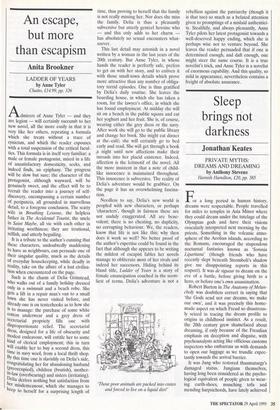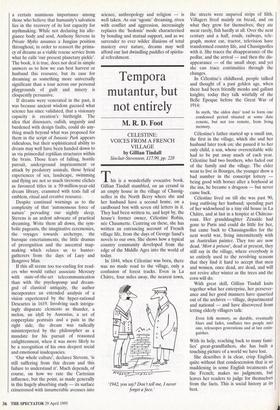Sleep brings not darkness
Jonathan Keates
PRIVATE MYTHS: DREAMS AND DREAMING by Anthony Stevens Hamish Hamilton, £20, pp. 385 For a long period in human history, dreams were respectable. People travelled for miles to temples in Asia Minor where they could dream under the tutelage of the Olympian gods and have their visions oracularly interpreted next morning by the priests. Something in the volcanic atmo- sphere of the Aeolian islands, according to the Romans, encouraged the stupendous nocturnal fantasies known as `Somnia Liparitana' (though friends who have recently slept beheath Stromboli's shadow give me disappointing reports in this respect). It was de rigueur to dream on the eve of a battle, before giving birth to a hero, or before one's own assassination.
Robert Burton in The Anatomy of Melan- choly was doubtless correct in saying that `the Gods send not our dreams, we make our own', and it was precisely this home- made aspect on which Freud so disastrous- ly seized in tracing the dream profile to origins in childhood instinct. As a result, the 20th century grew shamefaced about dreaming, if only because of the Freudian emphasis on deception and disguise, with psychoanalysts acting like officious customs inspectors who embarrass us with demands to open our luggage as we trundle expec- tantly towards the arrival barrier.
It was Jung who restored thaumaturgy's damaged status. Jungians themselves, having long been considered as the psycho- logical equivalent of people given to wear- ing earth-shoes, munching tofu and mending harpsichords, have lately achieved a certain numinous importance among those who believe that humanity's salvation lies in the recovery of its lost capacity for mythmaking. While not declaring his alle- giance body and soul, Anthony Stevens in Private Myths assumes a Jungian position throughout, in order to reassert the prima- cy of dreams as a viable rescue service from what he calls 'our present planetary pickle'. The book, it is true, does not deal in simple answers as to how we can best harvest or husband this resource, but its case for dreaming as something more universally significant than a tour across our personal playgrounds of guilt and misery is eloquently persuasive.
If dreams were venerated in the past, it was because ancient wisdom guessed what science has since validated, that a visionary capacity is creation's birthright. The idea that dinosaurs, oafish, ungainly and burdened with design faults, could do any- thing much beyond what was proposed for them in the script of Jurassic Park appears ridiculous, but their sophisticated ability to dream may well have been handed down to us via primordial reptilian structures within the brain. Those fears of falling, hostile pursuit, underground imprisonment or attack by predatory animals, those lyrical experiences of sex, landscape, swimming and flying are not so much tiresome cliches as favoured titles in a 50-million-year-old dream library, crammed with texts full of emblem, ritual and creative resource.
Despite continual warnings as to the complexity of that 'autonomous force of nature' pervading our nightly sleep, Stevens is an ardent advocate of practical dreaming. Write them all down, the sym- bolic pageants, the imaginative ceremonies, the voyages towards archetype, the baroque entertainments, the little dramas of precognition and the ancestral map- making which relates us to hunter- gatherers from the days of Lucy and Boxgrove Man.
If this all seems too toe-curling for read- ers who would rather associate Mercury with state-of-the-art telecommunication than with the psychopomp and dream- god of classical antiquity, the author incorporates an extended analysis of a vision experienced by the hyper-rational Descartes in 1619. Involving such intrigu- ingly disparate elements as thunder, a melon, an idyll by Ausonius, a set of copperplate portraits and a pain in the right side, the dream was radically misinterpreted by the philosopher as a mandate for his pursuit of reasoned enlightenment, when it was more likely to be a recognition of his own deepest social and emotional inadequacies.
`Our whole culture', declares Stevens, 'is still suffering from this dream and this failure to understand it'. Much depends, of course, on how we rate the Cartesian influence, but the point, as made generally in this hugely absorbing study — its surface crisscrossed with innumerable avenues into science, anthropology and religion — is well taken. As our `agonic' dreaming, riven with conflict and aggression, increasingly replaces the `hedonic' mode characterised by bonding and mutual support, and as we surrender to ever wilder illusions of total mastery over nature, dreams may well afford our last dwindling puddles of spiritu- al refreshment.



























































 Previous page
Previous page